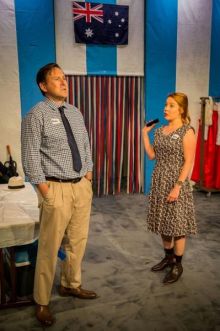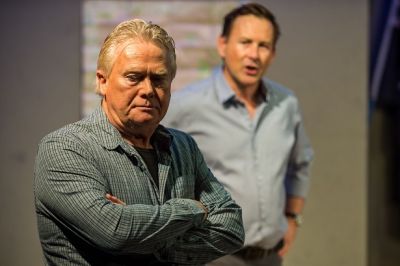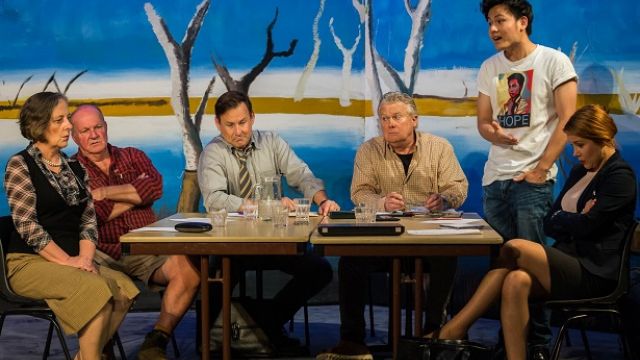Australia Day
In the imaginary town of Coriole, a committee of six has the task of organising the annual Australia Day Celebrations. They are character types one might find among the members of any organisation, country or city - an aspiring politician, a green feminist, a redneck denialist, a token ‘new’ Australian. To put them together on the Australia Day Committee of a small country town provides the basis of comic satire, for which playwright Jonathan Biggins is well known.
It it also means that they could appear as stereotypes. Finding their third dimension depends on the vision and passion of the director. Lousie Fischer, in her director’s notes writes: “They (the characters) are funny, flawed, feisty and sometimes not very nice. But they are human, they have hearts and intentions that, whilst maybe misguided, are meant well … I wanted to find truths rather than caricatures.”
 Thus Fischer uses the first scenes to try to make the characters believable as well as recognisable. Sure, the wit of Biggins’ dialogue and banter makes each character ‘type’ very clear right from the beginning, but Fischer and her cast aim to find their strengths as well as their vulnerabilities. This makes them a little more convincing whilst still sustaining the humour that arises from the coming together of their very different outlooks on the contemporary world.
Thus Fischer uses the first scenes to try to make the characters believable as well as recognisable. Sure, the wit of Biggins’ dialogue and banter makes each character ‘type’ very clear right from the beginning, but Fischer and her cast aim to find their strengths as well as their vulnerabilities. This makes them a little more convincing whilst still sustaining the humour that arises from the coming together of their very different outlooks on the contemporary world.
Peter Eyers plays Brian Harrigan, chair of the committee. Owner of the local hardware shop, he is also the mayor and is seeking pre-selection for the next election. Eyers finds humour in the arrogance and pomposity of this character as he tries to curry favour and support, especially that of fellow councilor Robert Wilson, who is the secretary of the committee.
Martin Portus establishes Wilson as a good manager, who tries to keep the calm and see everyone’s point of view. As such he listens, watches and interferes when things get heated in order to maintain some sort of balance – no easy feat with such diverse personalities.
Alice Livingstone obviously relishes her role as Maree Bucknell, representing the Country Women’s Association, complete with biscuits, scones and conservative values. Livingstone finds the organising busy-ness of this character in fussy gestures, a stiff back and prissy expressions. She is the most endearing of the characters because she is so identifiable.
The most unlikeable – but funniest – character in the play is Wally Stewart, played in this production with very politically incorrect enjoyment by Les Asmussen. A global warming denier and anti-conservationist, Wally speaks his mind vehemently and aggressively – and Asmussen finds all the colour and cringe that Biggins has written into this ‘shock jock’ style character.
 Amelia Roberson-Cuningham plays his nemesis, Helen. A green, feminist single mother who questions anything that might appear racist or discriminatory – including the sausage sizzle – she rubs Wally up the wrong way with every view she espouses and offends Maree with every information technology-based improvement she suggests. This makes for some very funny interactions … as well as some telling social comment.
Amelia Roberson-Cuningham plays his nemesis, Helen. A green, feminist single mother who questions anything that might appear racist or discriminatory – including the sausage sizzle – she rubs Wally up the wrong way with every view she espouses and offends Maree with every information technology-based improvement she suggests. This makes for some very funny interactions … as well as some telling social comment.
Into this melee of opinions and disagreement comes school-teacher Chester Lee, a first generation Australian of Vietnamese parents, who is new to the committee. Easy going, a bit of a joker, Lee is well played by Lap Nguyen. He too watches and listens carefully, making the most of his quippy one-line interjections.
Once Australia Day arrives, the satire takes over and mayhem rains – literally. Food poisoning, a thunder storm and the ‘no show’ of the Australia Day ambassador all combine to play havoc with the celebration, leaving the committee soaked and their organisation in tatters, but bringing them together as only chaos can.

Fischer uses the first half of this play to find some realistic dimension in the characters despite their stereotypical personas and their possibly offensive views – but pushes the pace of the second half to make the most of the satirical comedic chaos that ensues.
David Marshall Martin has designed a set that converts at interval from Scout Hall to celebratory marquee and Nicola Block’s use of flourescent lights makes the Scout Hall meeting room starkly believable. Mehran Mortezaei has made use of iconic bush sounds and Aussie music to break the scenes and raise both the tempo of the play and the mood of the audience.
Carol Wimmer
Photos © Chris Lundie
Subscribe to our E-Newsletter, buy our latest print edition or find a Performing Arts book at Book Nook.

